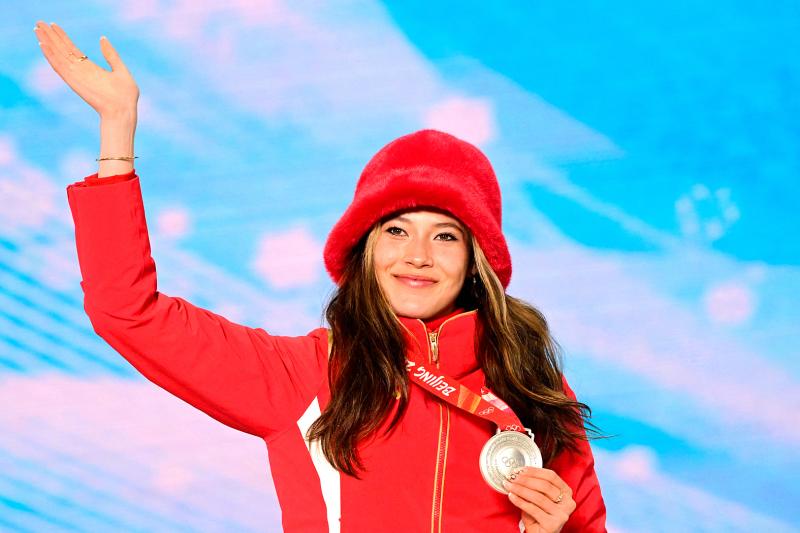She is an exceptional athlete who has already won medals in the Beijing Olympics. But the deep fascination with Eileen Gu’s (谷愛凌) origin story has threatened to overshadow anything she does on the slopes.
As the freestyle skier chases gold in the mountains northwest of Beijing, some competing narratives about her have taken hold, from California to China.
Some have the San Francisco native skiing for the Chinese team to secure more lucrative endorsements. In others, she has betrayed the US, where she was born and grew up, to ski for China, her mother’s native country.

Photo: AP
And a third: She was way too young to have made the decision to “abandon” the US for China, where a single misstep could lead a repressive government to restrict her movement or her speech.
ROLE MODEL
For her part, the 18-year-old athlete has said she wants to inspire girls in China, where there are few female role models in sports.

Photo: AFP
The frenzy to “explain” Gu’s choice reflects biases and misunderstandings in the US about Asian American identity.
She has genuinely strong connections to China, like many others in the Chinese diaspora who are taking advantage of opportunities and resources both in the Western countries where they grew up and in an increasingly wealthy China.
“What she represents is a new trend,” says Yinan He, an associate professor of international relations at Lehigh University in Bethlehem, Pennsylvania, “simply because China has become so wealthy and powerful and attractive and generating opportunities not available to immigrants here.”
Gu is particularly well placed to take advantage of these opportunities.
As engineers retired from Chinese government ministries, her grandparents were part of the professional elite. Her mother, Yan Gu, 58, left China in the 1980s to pursue graduate studies in the US and now works as a private investor with a focus on China, according to LinkedIn. Her father has never been publicly identified.
Gu had an upper middle-class upbringing and private school education in the US, and she says she’s equally comfortable in both countries.
“When I’m in China, I’m Chinese,” she told the Olympic Channel in 2020. “When I’m in the US, I’m American.”
Many immigrants and their children feel this duality. Few are allowed to live it.
“It’s sort of ironic because in half our cases, people use anti-Chinese rhetoric and are telling us to go back home. They’re telling us, ‘You don’t belong here. We don’t accept you.’ And then this is sort of the opposite: ‘Why aren’t you representing your home?’” says Russell Jeung, an Asian American Studies professor at San Francisco State University. “And so we lose either way.”
It turns out that, in a world where elite athletes increasingly cross borders to compete, Gu is not that unusual. No one thinks twice about a Senegalese winger in the English Premier League or a Japanese pitcher in Major League Baseball.
CROSSING BORDERS
And Gu is just one of many Asian Americans whose family immigration tales are on display at the Beijing Olympics. Nathan Chen, who won a gold for the U.S. in figure skating, was born in Utah to immigrants from China. Snowboarder Chloe Kim, who won her second gold for the US in the women’s halfpipe, was born in California to Korean immigrants.
So what makes Gu the subject of such intense fascination? She is perhaps a perfect storm of elements.
Unlike many athletes who change countries to compete, Gu could have easily skied for the US team — and that perhaps heightens the feeling of betrayal. Her modeling work with global brands from Louis Vuitton to Victoria’s Secret makes her more visible than other athletes.
“She gets a lot of attention because of that, because there is always that focus on femininity and appearance for female athletes,” says Robert Hayashi, a professor at Amherst College who specializes in Asian American history and sports studies.
That fascination is evident from the gross tonnage of social media commentary she attracts in both countries.
A recent Instagram post showing her on the medal stand following her gold medal-winning performance in the Big Air competition garnered 402,000 likes and 51,000 comments. And China’s Twitter-like Sina Weibo said its servers were briefly overloaded with adoration for the champion following her win.
But there can be a dark side. Critics in China have chided Gu for failing to use her platform to advocate for Internet freedom in a country that tightly restricts access for its citizens. On Tuesday, she largely dodged a reporter’s question about whether she compromised by choosing China, saying she uses her voice as much as she can.
“We’ll see if her stance ... will be fully accepted there over the long run,” says Rui Ma, founder of the San Francisco-based investment consulting firm Tech Buzz, who immigrated from China to the US as a child in 1989. “It certainly doesn’t seem to be accepted by many Americans at the moment.”
Gu also represents how dramatically migration from China to America has changed. While many continue to move to the US for low-wage jobs, they’re increasingly being outpaced by migrants with flexibility and the money to spend summers in China and maintain regular contact with family at home. They are more likely to be bicultural, openly embracing their heritage unlike earlier generations who were told — and believed — that integration was their ticket to acceptance.
“There are benefits to being Chinese and engaging with China, the country and the culture,” Ma says.
Scott Kennedy, senior adviser and expert on China at the Center for Strategic & International Studies in Washington, DC, says Gu’s story shows that the complexities of the globalized world don’t always line up neatly with geopolitical lenses.
“Her story speaks to the benefits, the value, the opportunities that come from an interconnected world,” he says. “Her gold medal may be placed in China’s column. But her success is a global success.”

A “meta” detective series in which a struggling Asian waiter becomes the unlikely hero of a police procedural-style criminal conspiracy, Interior Chinatown satirizes Hollywood’s stereotypical treatment of minorities — while also nodding to the progress the industry has belatedly made. The new show, out on Disney-owned Hulu next Tuesday, is based on the critically adored novel by US author Charles Yu (游朝凱), who is of Taiwanese descent. Yu’s 2020 bestseller delivered a humorous takedown of racism in US society through the adventures of Willis Wu, a Hollywood extra reduced to playing roles like “Background Oriental Male” but who dreams of one day

The entire saga involving the Taiwan People’s Party (TPP) and its Chairman Ko Wen-je (柯文哲) continues to produce plot twists at such a rapid pace that fiction publishers would throw it out for being ridiculously improbable. This past week was particularly bizarre, but surprisingly the press has almost entirely ignored a big story that could have serious national security implications and instead focused on a series of salacious bombshell allegations. Ko is currently being held incommunicado by prosecutors while several criminal investigations are ongoing on allegations of bribery and stealing campaign funds. This last week for reasons unknown Ko completely shaved

Gabriel Gatehouse only got back from Florida a few minutes ago. His wheeled suitcase is still in the hallway of his London home. He was out there covering the US election for Channel 4 News and has had very little sleep, he says, but you’d never guess it from his twinkle-eyed sprightliness. His original plan was to try to get into Donald Trump’s election party at Mar-a-Lago, he tells me as he makes us each an espresso, but his contact told him to forget it; it was full, “and you don’t blag your way in when the guy’s survived two

The self-destructive protest vote in January that put the pro-People’s Republic of China (PRC) side in control of the legislature continues to be a gift that just keeps on giving to the Chinese Nationalist Party (KMT). Last week legislation was introduced by KMT Legislator Weng Hsiao-lin (翁曉玲) that would amend Article 9-3 of the Act Governing Relations Between the People of the Taiwan Area and the Mainland Area (臺灣地區與大陸地區人民關係條例) to permit retired and serving (!) military personnel to participate in “united front” (統戰) activities. Since the purpose of those activities is to promote annexation of Taiwan to the PRC, legislators